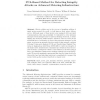Free Online Productivity Tools
i2Speak
i2Symbol
i2OCR
iTex2Img
iWeb2Print
iWeb2Shot
i2Type
iPdf2Split
iPdf2Merge
i2Bopomofo
i2Arabic
i2Style
i2Image
i2PDF
iLatex2Rtf
Sci2ools
292
Voted
QEST
2015
IEEE
2015
IEEE
PCA-Based Method for Detecting Integrity Attacks on Advanced Metering Infrastructure
Electric utilities are in the process of installing millions of smart meters around the world, to help improve their power delivery service. Although many of these meters come equipped with encrypted communications, they may potentially be vulnerable to cyber intrusion attempts. These attempts may be aimed at stealing electricity, or destabilizing the electricity market system. Therefore, there is a need for an additional layer of verification to detect these intrusion attempts. In this paper, we propose an anomaly detection method that uniquely combines Principal Component Analysis (PCA) and Density-Based Spatial Clustering of Applications with Noise (DBSCAN) to verify the integrity of the smart meter measurements. Anomalies are deviations from the normal electricity consumption behavior. This behavior is modeled using a large, open database of smart meter readings obtained from a real deployment. We provide quantitative arguments that describe design choices for this method and use ...
| Added | 16 Apr 2016 |
| Updated | 16 Apr 2016 |
| Type | Journal |
| Year | 2015 |
| Where | QEST |
| Authors | Varun Badrinath Krishna, Gabriel A. Weaver, William H. Sanders |
Comments (0)

